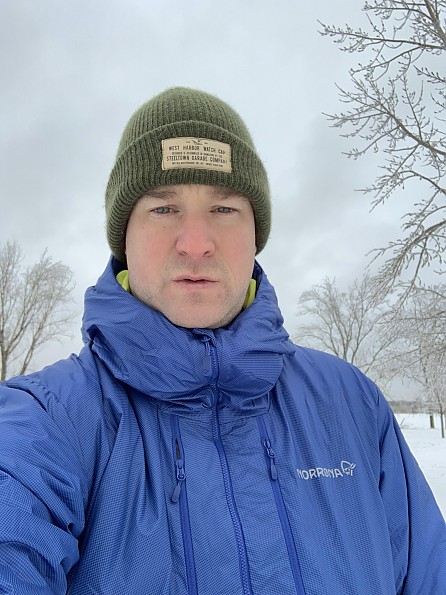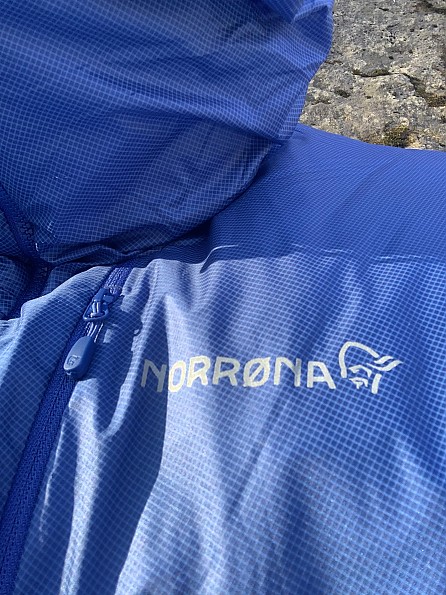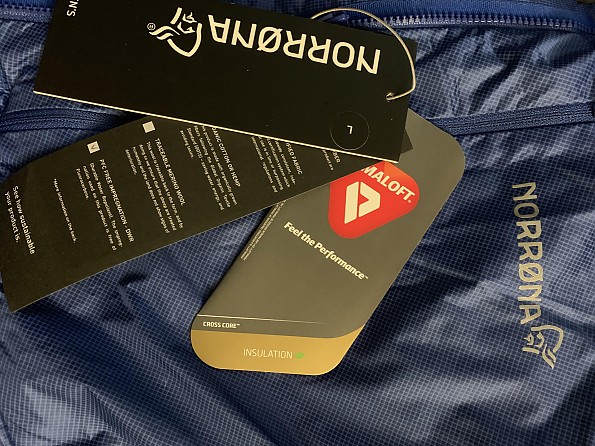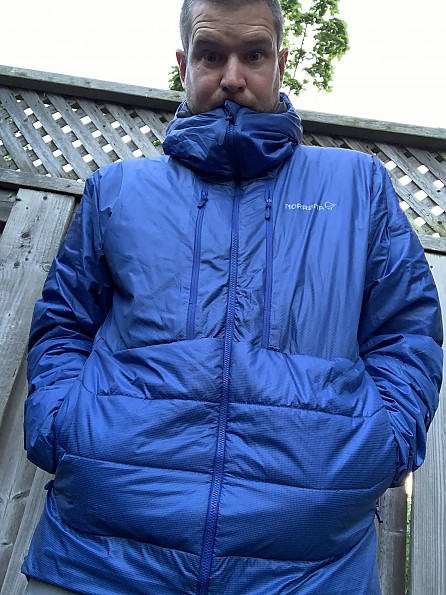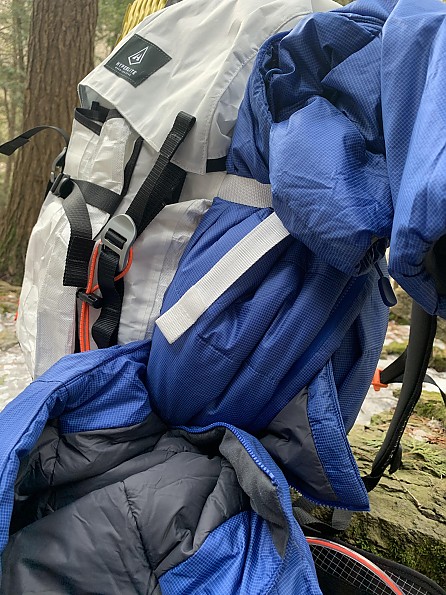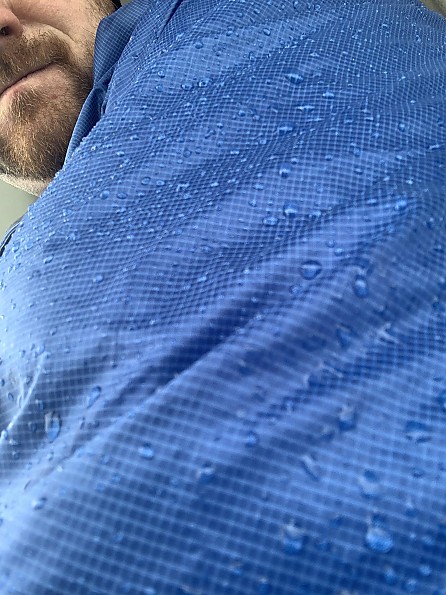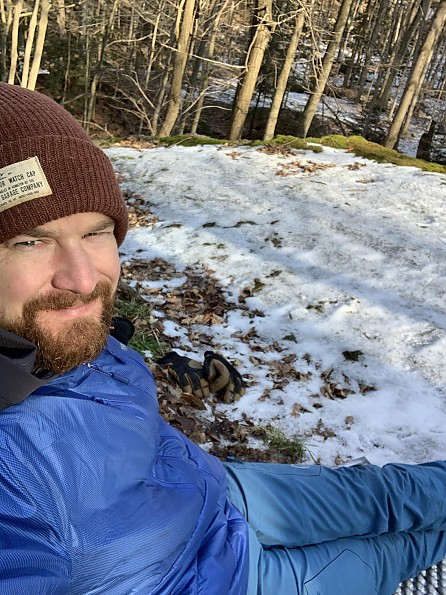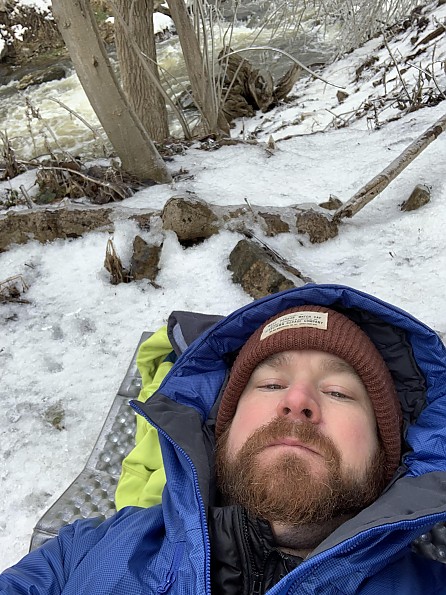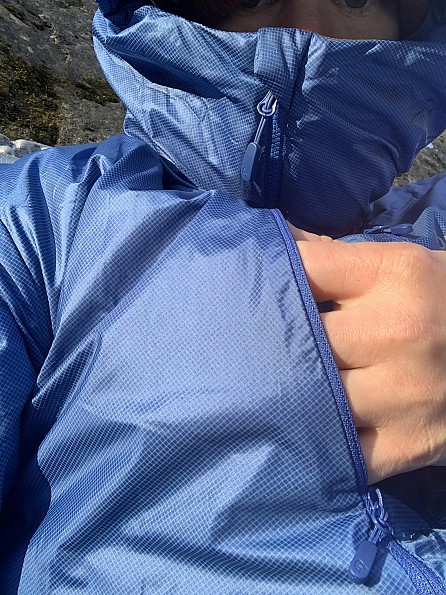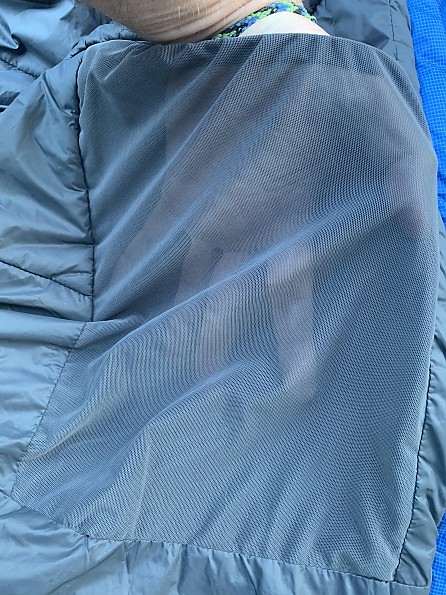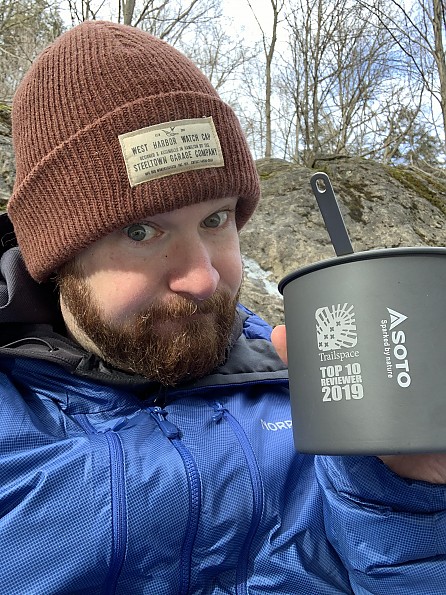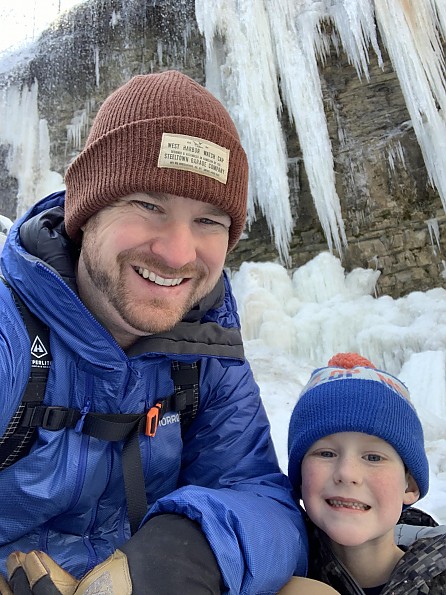Norrona Trollveggen Primaloft100 Zip Hood
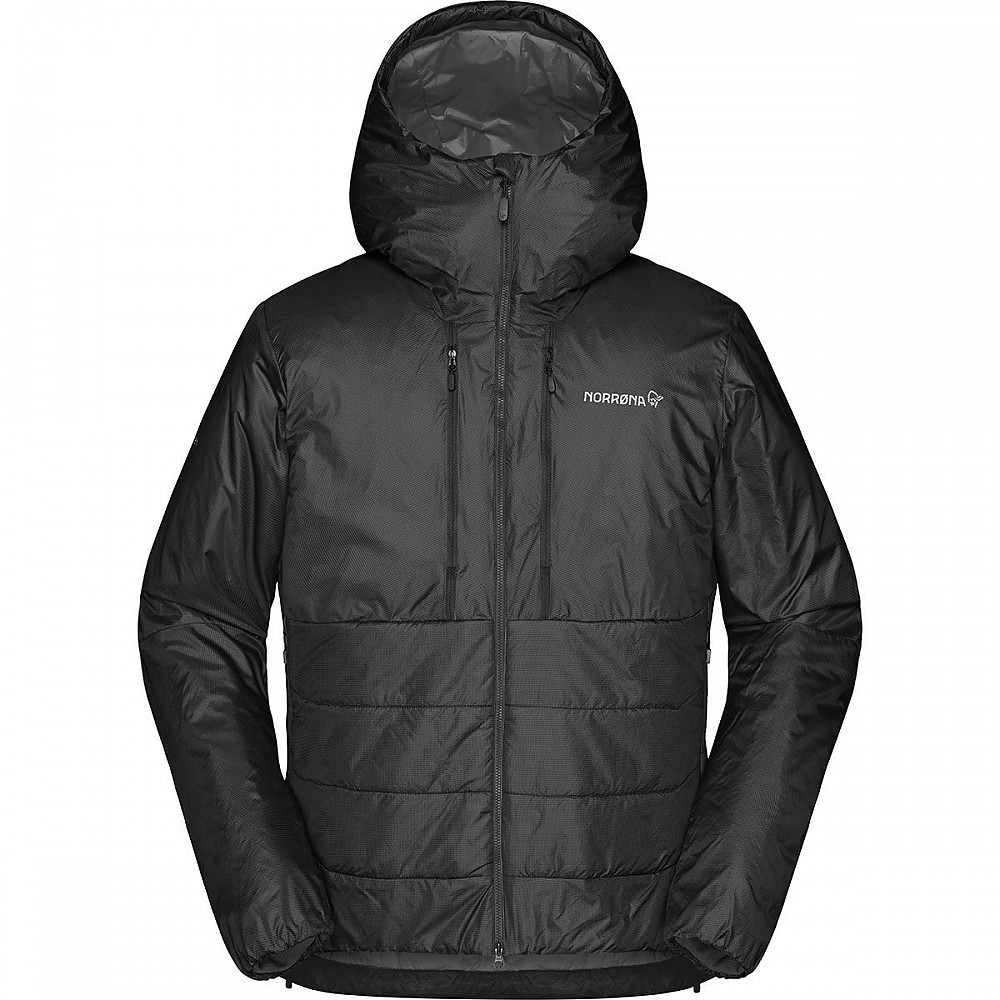
The Norrøna Trollveggen Primaloft 100 Zip Hood is a synthetically insulated jacket which utilizes Primaloft's Gold Aerogel (more info on Aerogel below), mapped out to provide an incredible amount of warmth, especially compared to the weight. This jacket is an ideal belay/last line of defense for when the proverbial "stuff" hits the fan. As you can see below the amount of designs Norrøna has nailed in this product are, well, all of them. This is a jacket that has clearly been devised, used, tested, and perfected by spending days on the mountain in the winter.
Pros
- Warmth (both stationary and active)
- Weight
- Weather resistance
- Drop hem
- Oversized hood
- Durable face fabric
- Smooth zipper
- Accessible pockets (two hand, two chest)
- Interior dump pocket
- Colour
- Value
- Rolled cuff
- Price
Cons
- Breathability
- Less packable than down (that's more an inherent fact about synthetics in general...I had to put something here, right?)
FIT AND COMFORT
For reference I am six foot tall, 175 pounds, and ordered the size large. I usually fall somewhere on the high end of a medium to the low end of a large, and that was exactly the case on the sizing chart provided by Norrøna. I wanted to use this jacket more as an outer layer and hence went with the larger size.
The fit of the Trollveggen Primaloft100 Zip Hood is what I would describe as oversized. It is certainly not a restrictive fit, especially in comparison to the more traditional European sizing. As mentioned above, I did intentionally choose the larger size for use as a belay jacket.
The torso allows for some layering underneath—a fleece layer, hoodie, or even a light puffy will all fit under the Trollveggen. The length is great, complimented by a drop hem that extends an additional two inches to cover the backside, great for keeping warm when sitting down. There is a one-handed hem adjustment as well should you need to seal off any drafts. The long length also allows it to remain tucked in under a harness or backpack waist belt.
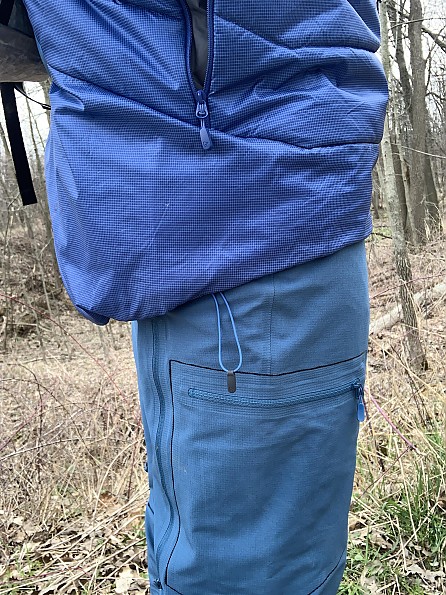
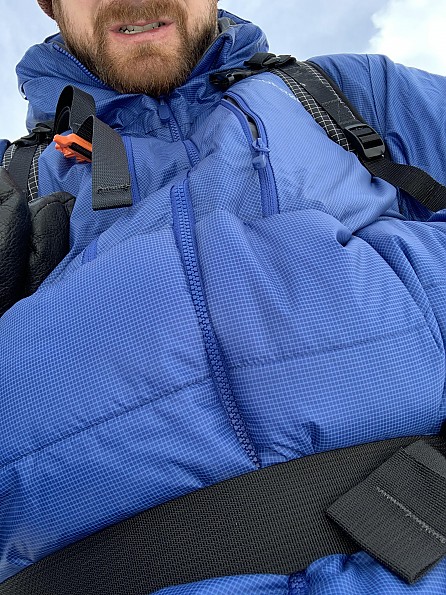
The arms are long, possibly to a bit of an excess, although that is more than welcome when trying to turtle your hands up, and in, to the jacket. At the wrist there are rolled cuffs and while initially skeptical (they look a little silly, and when paired with the extra sleeve length it kinda looks like you are wearing your Dad's coat), they function really, really well. They allow the jacket to cover part of the way up the hand and pair equally as well with gloves and mittens.
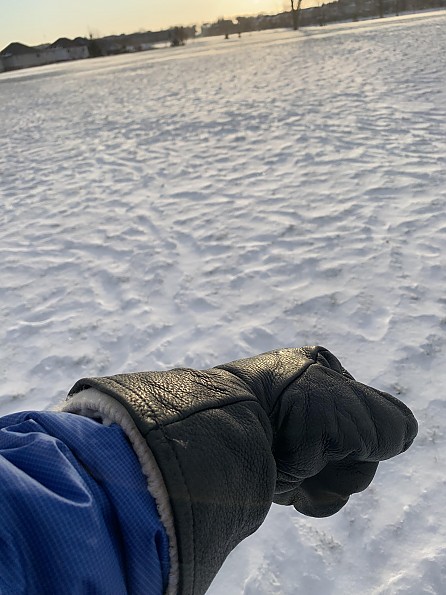
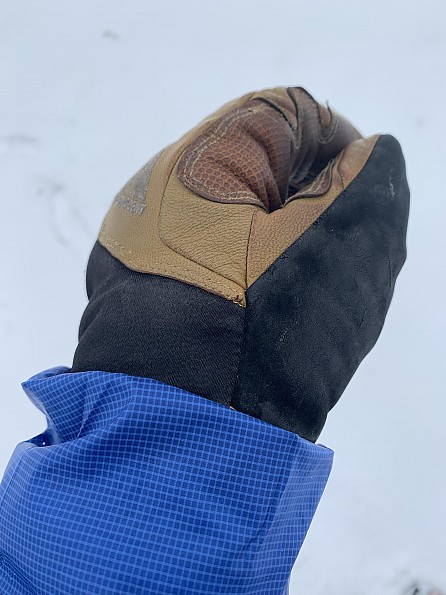 Large mitten gauntlet going over the sleeve, and winter weight glove tucked under.
Large mitten gauntlet going over the sleeve, and winter weight glove tucked under.
The hood, oh the hood...probably my favourite part of this jacket. This thing is massive while somehow walking the line of working just as well with no head wear. There are very few companies (Arc'teryx is the only one that comes to mind off the top of my head, pun unintended, but I'm proud of it) that design a hood this well. It fits a climbing helmet without any tight spots yet somehow doesn't completely engulf and restrict vision when worn alone.
There is a stiff wire brim to allow you to shape it and a back toggle to adjust the size. It is also cut to allow full peripheral vision. As an unabashed, self-proclaimed hood connoisseur this one knocks it out of the park.
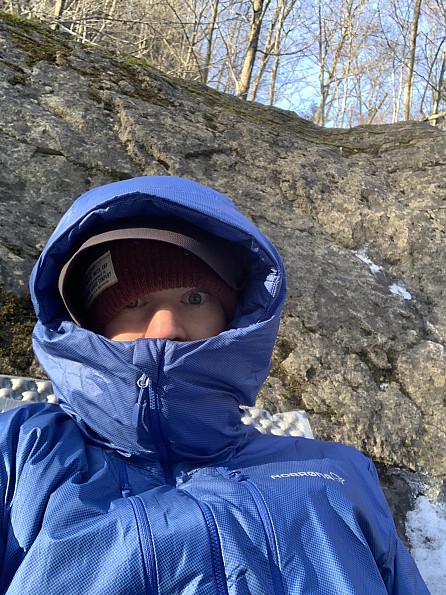
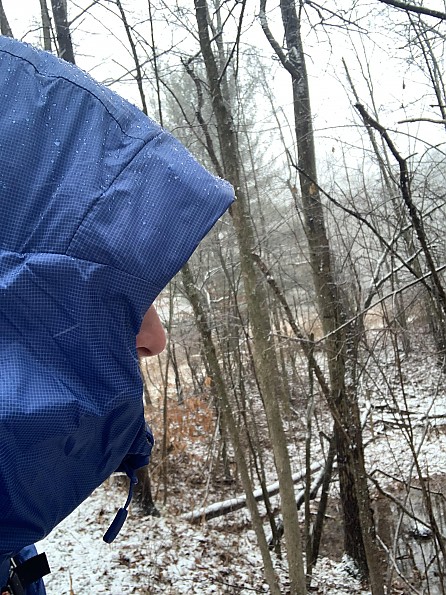
From a comfort perspective the lightweight rip-stop Cordura is silky smooth against the skin, so even a T-shirt feels comfortable underneath. The breathability is low, so it can become a little clammy should you start to overheat and sweat, easy to counteract by venting through unzipping, taking off, etc.
There aren't too many ways to tinker with the fit. The common hem adjustment is a one-handed drawcord, the wrists have elastic but no velcro, and the hood has the single rear cinch. In my opinion I don't see it lacking in this as the fit is so good for me that I never even use the two drawcords as it is.
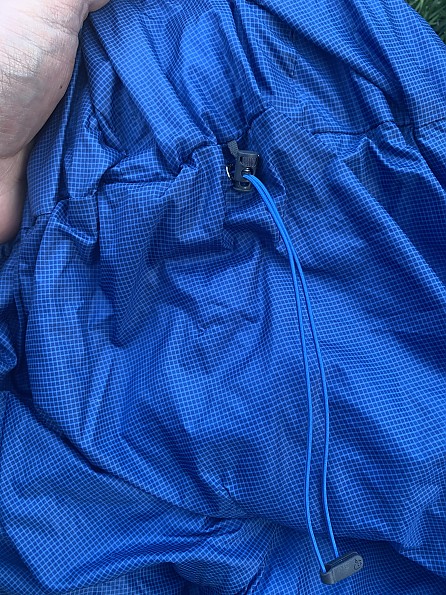 Hood cinch
Hood cinch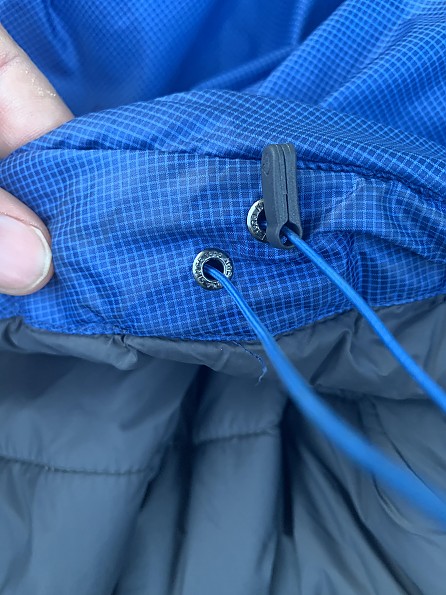 One-handed hem cinch, my thumb is on the button to release the cinch.
One-handed hem cinch, my thumb is on the button to release the cinch.
WEATHER RESISTANCE
The term bomb proof is so overused in outdoor equipment that I dislike repeating it, so I'm not going to. I will say that for the weight this is about as fortress-like as it gets. Snow bounces right off as the shell is tightly woven and a DWR has been applied. As for rain, well you'll have at least a couple minutes, even in a hard rain, to get your dedicated shell out. It is filled with synthetic insulation as well, so should it get wet it will retain some of its insulative abilities and dry faster than down. It is also completely windproof, even 30-mile-per-hour winds in below freezing temps don't affect the wearer...it's impressive in its protection.
BREATHABILITY
Low. There are no fleece panels, pit zips, or mesh-lined pockets as a way to vent moisture. As mentioned above, it is also highly windproof; you really can't have both. I'd much prefer the protection mentioned above (in the weather resistance section) as a tradeoff. I don't wear this jacket when active. If I'm moving, or working hard, it's off, or completely unzipped at the least.
WARMTH
I normally don't like to give direct comparisons in my reviews however, last winter I bought the Patagonia Micro Puff Hoody which I had intended to be used as a warm/lightweight winter belay/over-jacket (I prefer synthetic insulation for this application). I was/am so incredibly disappointed in that purchase as it costs me a ton (as all Patagonia stuff does) and was little more than a windshell. This jacket, however, the Norrøna Trollveggen, is half the price and double the warmth. I mentioned the wind and water resistance above to give some temperature specific references:
Stationary (around camp, belays, rest stops)
On its own with just a T-shirt I would feel comfortable at around 0°c / 32°f to around -5°c / 23°f, maybe -7°c / 19.4°f with some sunshine.
If you were to layer a hoodie underneath, either fleece or insulated, I have been comfortable down to -15°c / 5°f.
With a standard base layer, insulated mid-layer, this jacket and then a shell layer you should be comfortable down to -20°c / -4°f; anything below that and I'm reaching for the Michelin Man-sized puffy.
Active (hiking, climbing, snowshoeing)
The same as above; anything even close to 0°c / 32°f, especially moving, and this jacket just packs too much power.
The 15°c to -5°c range (5°f to 23°f) is the perfect sweet spot to me for this jacket and where I find myself using it the most. Either vented with a fleece under, or zipped if alone, and you are good, even at the lower end of the spectrum.
I personally run a little hot, so a mid-layer and this zipped and I'm more than toasty -15°c to well below -20°c if active (5°f to -4°f).
FUNCTION
Again, everything about this piece has been thoroughly thought out and executed. Pockets are multiple, placed high, and accessible unimpeded by a pack waist belt or harness. Zippers run smooth even when dunked up with ice and snow. All toggles are one-handed for adjustments on the fly. Interior dump pockets to dry or thaw. I can't say enough about the success Norrøna has pulled off.
FEATURES
Primaloft Aerogel
I believe the warmth of this jacket comes largely down to its use of the Primaloft Gold Aerogel insulation. If you are unsure of what this is I highly recommend looking into Aerogel (specifically), as it is the lightest solid known to man, and has been used by NASA to protect its astronauts from extreme temperatures...good enough for them, good enough for me.
There's a good article (albeit a little press release/marketing tone) to learn more here.
- Helmet-compatible hood
- Hand warming pockets with quilted front = extra warmth
- Drop hem
- Interior dump pockets
CONCLUSION
The Norrøna Trollveggen Primaloft100 Zip Hood is a knock out of the park, smash winner in the synthetic insulated jacket category. Very high warmth-to-weight ratio, attention to detail, perfect fit, and weather resistance make it impossible for me to give this anything but five stars.
Background
I have been hiking, climbing, and mountaineering for as long as I can remember. This jacket has been used almost every day (over a six-month span) to gain familiarity, and has probably logged over 100 days in the field. As mentioned in the review, I have been looking for a synthetically insulated belay jacket for years, with none coming even close to this level of success. This one has seen temperatures down south of -30°c / -22°f, wind chills, snow, ice, rain, and everything in between. It did not leave my pack, or body, this past winter for any occasion—hiking, backpacking, climbing, ice climbing, and mountaineering.
Source: received for testing via the Trailspace Review Corps
(Sample for testing and review provided by Norrøna)
Your Review
Where to Buy
You May Like
Specs
| Men's | |
|---|---|
| Price |
MSRP: $259.00 Historic Range: $230.99-$329.00 |
| Weight |
528 g |
| Insulation |
Recycled PrimaLoft Gold 100 g Aerogel insulation |
| Footprint |
Oeko-Tex Certified Fabric, PFC-Free DWR, Bluesign Certified Fabric, inspected factory |
| Women's | |
|---|---|
| Price |
MSRP: $259.00 Historic Range: $112.42-$329.00 |
| Weight |
482 g |
| Insulation |
Recycled PrimaLoft Gold 100 g Aerogel insulation |
| Footprint |
Oeko-Tex Certified Fabric, PFC-Free DWR, Bluesign Certified Fabric, inspected factory |


